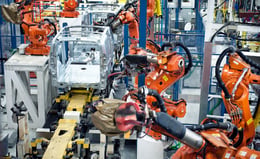How Can Industry 4.0 IT Integration Be Achieved Smoothly?
Ute Strohmaier - January 23, 2024

In the era of Industry 4.0, where the Industrial Internet of Things (IIoT) is reshaping the manufacturing landscape, the integration of operational technology (OT) with centralized IT solutions is imperative for unlocking the full potential of these transformative systems. As IT managers, you understand that the true value of IIoT lies not just in the deployment of internet-capable devices on the factory floor but in the seamless convergence of these technologies with existing business infrastructures.
The Challenge of Integration
For manufacturers, achieving a high level of technological integration between disparate systems can be a formidable challenge. However, the rewards are transformative. The dissipation of information and decision-making silos, coupled with the interconnectedness of planning and production streams, leads to a more holistic and accessible view of the entire value chain. This integration enables sales teams, engineers, and production planners to share real-time data, fostering a collaborative environment that goes beyond day-to-day workflows.
Key Considerations for Integration
To ensure the successful integration of systems, several key considerations must be taken into account. The choice of software solutions plays a pivotal role in supporting production and transportation planning. Here are some factors to consider:
-
Open Technology: Opt for solutions built on open technology principles. Open-source solutions, particularly those leveraging Linux and containers, provide flexibility and adaptability crucial for seamless integration.
-
Container Orchestration with Kubernetes: Implementing Kubernetes ensures efficient container orchestration, allowing for the deployment, scaling, and management of containerized applications. This brings agility and scalability to your IT infrastructure.
-
Interfaces & APIs: Look for systems that support a variety of interfaces and APIs. This facilitates smooth communication between different components of your IT ecosystem, promoting interoperability and streamlined data exchange.
Supported Formats and Protocols
The ability to support diverse data formats and communication protocols is crucial. Your chosen solution should effortlessly handle a range of data formats, including Parquet, Protobuf, JSON, CSV/Excel, and proprietary formats. Likewise, support for protocols like REST/OpenAPI, gRPC, BLOB storage (S3), and Message Queuing ensures compatibility with various data sources and destinations.
Integration with AI and Analytics Platforms
A modern solution should seamlessly integrate with AI and analytics platforms. This enables manufacturers to harness the power of data-driven insights for optimizing processes across the entire value stream.
flexis SaaS: Empowering You with Open Integration
The flexis SaaS platform stands out as an open and transparent solution, putting you in control of your data. With support for Linux, containers, Kubernetes, diverse data formats, and communication protocols, flexis SaaS ensures straightforward integration into existing systems. Its commitment to open technology allows your IT ecosystem to evolve with industry advancements.
Conclusion
As IT managers steering the course of Industry 4.0 adoption, prioritizing seamless integration between OT and centralized IT solutions is important. The path to a connected, collaborative, and optimized manufacturing environment leads through open technology, container orchestration, versatile interfaces, and API support. By choosing solutions like flexis interoperable solutions, you empower your organization with the tools needed to succeed in the dynamic landscape of modern manufacturing.
If you want to learn more, download your Guide to Industry 4.0.
In this Guide you will learn:
-
Key facts about Industry 4.0
-
How your company can move to the future of the supply chain industry
-
Benefits of implementing the Industry 4.0 framework
LATEST POSTS
- Understand Circular Economy in The Manufacturing Industry
- How Can Industry 4.0 IT Integration Be Achieved Smoothly?
- The Significance of Order Sequencing in Discrete Manufacturing
- How to improve your Supply Chain Management: The Power of Control Towers
- Optimizing Human Resource Scheduling in Manufacturing: A Technological Approach



